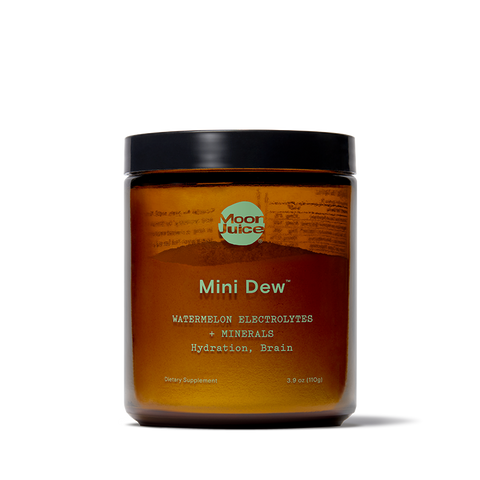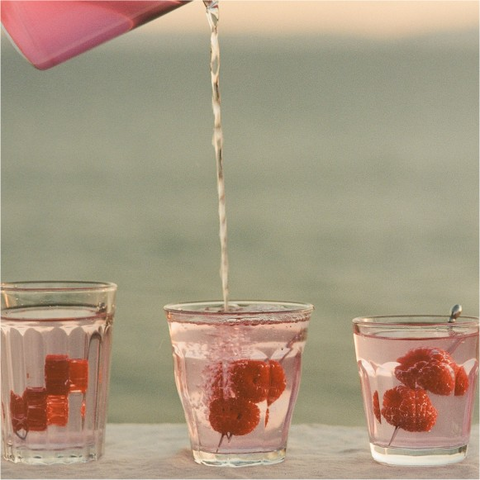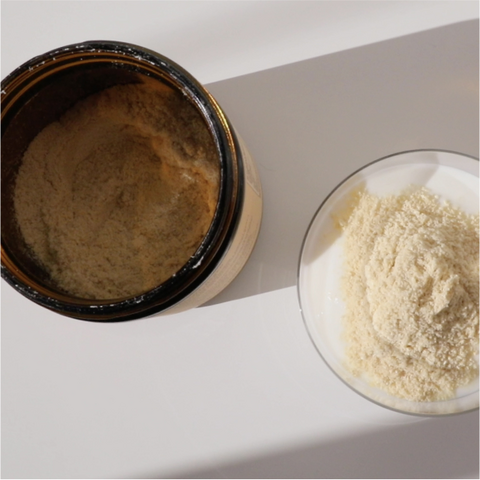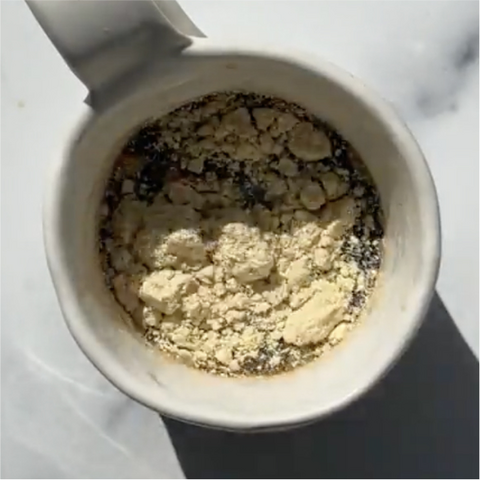When your hydration levels get compromised, recharging with electrolytes is more literal than you might think. Electrolytes are compounds that carry either a positive or negative charge when dissolved in water. There are many different types of electrolytes that are crucial for our health.
When we’re dehydrated due to excessive sweating, travel, loss of liquids, or just feeling blah, it’s important to replenish the electrolytes we’ve lost in order to maintain proper fluid balance and function in our bodies.
But what are the main electrolytes in our bodies in the first place, and which ones do we need to replenish? Different types of electrolytes might get excreted in different ways or be needed in different amounts by your body. Sodium, Potassium, and Chloride are often considered the 3 main electrolytes, but we’ll be covering the other essential ones as well. Ahead, we’ll discuss the 7 most significant electrolytes for balanced health and explain the electrolyte benefits of each for your body.
1. Sodium
Sodium is the major cation (that’s a positively charged ion) of fluids situated outside our cells. Our bodies need a small amount of Sodium, or about 500 mg daily, to maintain a proper cellular balance of water and minerals. Sodium is also vital for important functions like conducting nerve impulses and contracting or relaxing muscles.
Sodium is one of the chemical elements of salt, so it’s found naturally in salty foods, and we typically don't need to seek this out. But while a Sodium excess is common, 75% percent of that excess tends to come from processed foods. So, for those who maintain a natural, whole-food diet you're likely consuming a normal level of Sodium on a daily basis.
What about when you sweat? Sodium and Chloride are the two top electrolytes lost during a bout of excessive sweating. If you’re an athlete or someone who is losing significant amounts of Sodium through sweat, it could be a good idea to replenish it with electrolyte drinks.
Everyone sweats differently and has a different sweat Sodium concentration, which is why the amount recommended for athletes hasn’t been standardized. For some, it won’t be needed, but for others, especially endurance athletes exercising for several hours in the heat, replacing Sodium can be critical, and an electrolyte powder or drink could help rehydrate you better than plain water.
It’s always important to replenish with an adequate amount of fluids along with your Sodium, so an electrolyte powder or drink is the best way to receive this mineral. While there are many electrolyte drinks to rehydrate you, Mini Dew™ is a zero-sugar electrolyte drink powder for hydration and brain function, featuring key electrolytes, including Sodium in the form of Himalayan pink salt.
2. Potassium
Another familiar mineral, Potassium, is the most abundant intracellular cation, responsible for maintaining fluid volumes within the cell. It’s present in all your body’s tissues and like Sodium, it’s important for muscle contraction and nerve transmission, along with kidney function.
There’s a strong relationship between Sodium and Potassium, but they have an inverse effect when it comes to your blood pressure. Our bodies actually need more Potassium than Sodium, but the amount we likely get as part of the standard American diet is usually inverted. Dietary surveys show that people in the U.S. consume less than the recommended amount of Potassium needed, making this a “nutrient of public health concern,” according to the 2020-2025 Dietary Guidelines for Americans.
To consume more Potassium in your diet and to avoid a low electrolyte level, opt for electrolyte-rich fruits and vegetables like lentils, kidney beans, acorn squash, butternut squash, sweet potatoes, avocados, beets, potatoes, dried raisins, dried apricots, spinach, broccoli, watermelon, and bananas. Fresh juices and coconut water are quick ways to increase your Potassium in a pinch. But for sugar-free electrolytes, a quick sip of Mini Dew™ contains Potassium and other minerals needed to help your body optimize hydration levels.
3. Calcium
The most abundant mineral in your body, Calcium is a positively charged cation stored primarily in your bones and teeth, giving them strength and structure. Just like with the electrolytes already covered, your body needs Calcium for proper nerve and muscle movement.
Aside from traditional animal sources of Calcium such as milk, your plant-based sources will include kale, broccoli, and bok choy.
For a daily boost of Calcium and other electrolytes with no fillers or junk, you can find Calcium in Mini Dew™. Our electrolyte powder makes it easy for you to easily add electrolytes to water when you’re at home or on the go.
4. Magnesium
Magnesium is another major intracellular electrolyte in your body. Every cell needs this cation, and it’s responsible for over 300 enzymatic processes, including controlling the electrical and muscular activities of your heart. Other important benefits of magnesium include:
- Nerve conduction
- Regulating nerve irritability
- Muscle activity
- Breaking down carbs
- Converting food into energy
- Making protein, RNA, and DNA
- Helping bone and tooth enamel form
- Soothing for sleep and stress
Magnesium can be found in many foods, like almonds, spinach, black beans, cashews, kidney beans, and bananas. However, due to the nutrient depletion in today’s soils, it’s likely you’re not consuming enough magnesium from your diet alone. In fact, over 50% of us have a magnesium deficiency.
To supplement with magnesium, you can find the electrolyte in your Mini Dew™ mix in the form of Magnesium Gluconate. But Magnesium also comes in multiple forms that might have different functions in the body. If you’re looking for a dedicated daily Magnesium powder supplement to help you stay nourished, Magnesi-Om® contains 3 bioavailable forms of Magnesium plus L-Theanine to help restore cellular balance for relaxation, sleep, brain health, and regularity.*
5. Chloride
Chloride is an important anion (negatively charged!) electrolyte that’s present in our bodily fluids and blood.
Chloride plays a key role in balancing your body—by regulating body fluid, preserving electrical neutrality in your body, maintaining proper pH, easing the flow of oxygen and carbon dioxide in your cells, and regulating the nutrients going in and out of your cells. It also helps stimulate nerves and muscles, as well as the stomach acid needed for digestion.
Our main dietary source of Chloride is table salt (sodium chloride), and just like with Sodium, it’s not likely that you’ll need to seek this electrolyte out, especially since salt intake tends to be high. But any time you sweat excessively, lose body fluid or are otherwise dehydrated, it will become more important to pay attention to your body’s balance of these electrolytes.
You can find Chloride present in Mini Dew™ sourced from Himalayan pink salt.

6. Phosphate
“Phosphorus” is a mineral that’s needed by your body, and Phosphates are a form of Phosphorus, like the type you’ll find in common supplements.
Constituting about 1% of your total body weight, negatively charged Phosphorus is an essential electrolyte that’s important for many enzymatic reactions in the cell. It’s particularly important for your kidneys, muscles, blood vessels, and processes like tooth and bone mineralization and energy production. Because Phosphorus works with Calcium to build bones, and because your body absorbs less of one when the other is too high, it’s important to have both these electrolytes at a stable level to prevent an electrolyte imbalance.
Fortunately, Phosphorus is readily available in many natural foods, including sunflower and pumpkin seeds, beans and lentils, Brazil nuts and other nuts, soy, whole grains like oats, brown rice, and wheat, and pseudo grains like amaranth and quinoa. Because Phosphorus is easy to find as part of a diet, it’s not likely you’ll need to supplement it.
7. Bicarbonate
Bicarbonate is one of the major anions (negatively charged ions) in tissues, and extracellular fluids. Not a mineral like the other electrolytes on our list, Bicarbonate is actually a byproduct of your body’s metabolism. It plays a vital role in pH homeostasis in your body and is also used by different “transporters” to move other ions and substances across cells. This function plays an important role in cardiac function.
Our kidneys largely regulate our Bicarbonate, helping maintain an “acid-base” balance. When we’re sick and our bodies have flushed out our systems, this can result in Bicarbonate loss, and that balance becomes upset.
Takeaways
Electrolytes are crucial for maintaining balance within our bodies so that countless functions can be performed. There are many different types of electrolytes, but significant electrolytes for our health include Sodium, Potassium, Calcium, Magnesium, Chloride, Phosphate, and Bicarbonates.
These charged ions are important for hydration in our bodies, and when we lose fluids, we may need to prioritize electrolyte replacement to better support our systems. For instance, when we sweat, we primarily lose Sodium and Chloride, but we also lose small amounts of Potassium, Magnesium, and Calcium. When we’re sick, we’ll often lose Sodium, Potassium, and Bicarbonate.
During times of excessive fluid loss, it’s more important to pay attention to our electrolytes. In addition to that, 90% of the US has a mineral imbalance or deficiency, and 75% are considered chronically dehydrated.
To combat imbalance, an electrolyte supplement taken with water can help supply these electrically charged minerals to your body to support optimal hydration for balanced health.
Sources
- Harvard T. H. Chan School of Public Health, The Nutrition Source: Salt and Sodium. https://www.hsph.harvard.edu/nutritionsource/salt-and-sodium/
- National Library of Medicine, Sodium. https://www.ncbi.nlm.nih.gov/pmc/articles/PMC3951800/
- International Journal of Epidemiology, Salt intakes around the world: implications for public health. https://academic.oup.com/ije/article/38/3/791/684827
- Stanford Health News, Sodium 101 for athletes. https://news.sanfordhealth.org/healthy-living/sodium-101-for-athletes/
- National Library of Medicine, Health Professional Fact Sheet - Potassium. https://ods.od.nih.gov/factsheets/Potassium-HealthProfessional/
- Harvard T. H. Chan School of Public Health, The Nutrition Source: Salt and Sodium. https://www.hsph.harvard.edu/nutritionsource/salt-and-sodium/
- Dietary Guidelines for Americans. https://www.dietaryguidelines.gov/
- National Library of Medicine, Health Professional Fact Sheet - Potassium. https://ods.od.nih.gov/factsheets/Potassium-HealthProfessional/
- Healthline, 18 Foods That Pack More Potassium Than a Banana. https://www.healthline.com/nutrition/foods-loaded-with-potassium#how-much-potassium-do-you-need
- National Library of Medicine, Magnesium: The Forgotten Electrolyte—A Review on Hypomagnesemia. https://www.ncbi.nlm.nih.gov/pmc/articles/PMC6524065/#:~:text=Magnesium%20is%20one%20of%20the,it%20is%20the%20forgotten%20electrolyte
- University of Rochester Medical Center, Health Encyclopedia - Magnesium. https://www.urmc.rochester.edu/encyclopedia/content.aspx?contenttypeid=19&contentid=magnesium
- University of Rochester Medical Center, Health Encyclopedia - Magnesium. https://www.urmc.rochester.edu/encyclopedia/content.aspx?contenttypeid=19&contentid=magnesium
- European Journal of Internal Medicine, Chloride: The queen of electrolytes? https://www.ejinme.com/article/S0953-6205(11)00277-9/fulltext
- Harvard T.H. Chan School of Public Health, The Nutrition Source - Chloride. https://www.hsph.harvard.edu/nutritionsource/chloride/
- National Library of Medicine, Physiology, Phosphate. https://www.ncbi.nlm.nih.gov/books/NBK560925/
- Healthline, Top 12 Foods That Are High in Phosphorus. https://www.healthline.com/nutrition/foods-high-in-phosphorus
- University of Rochester Medical Center, Health Encyclopedia - Bicarbonate. https://www.urmc.rochester.edu/encyclopedia/content.aspx?contenttypeid=167&contentid=bicarbonate
- National Library of Medicine, Critical role of bicarbonate and bicarbonate transporters in cardiac function. https://www.ncbi.nlm.nih.gov/pmc/articles/PMC4160527/
- National Library of Medicine, Electrolytes. https://www.ncbi.nlm.nih.gov/books/NBK541123/
- National Library of Medicine, Fluid and Electrolyte Therapy During Vomiting and Diarrhea. https://www.ncbi.nlm.nih.gov/pmc/articles/PMC7185384/














